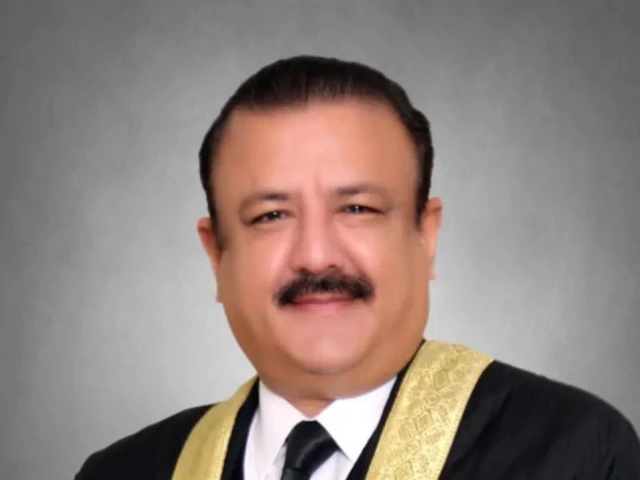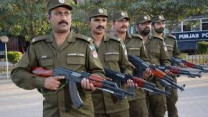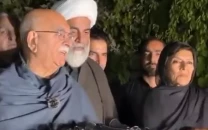Paying price of judicial independence: Jahangiri
Five-member CB to take up IHC judge's plea on Sept 29

Challenging the University of Karachi's last year decision to revoke his law degree after 32 years, Islamabad High Court (IHC) judge Tariq Mehmood Jahangiri has told the Sindh High Court (SHC) that he faces retribution from powerful members of the executive for exercising judicial autonomy.
On August 31, 2024, the University of Karachi's Syndicate annulled the allegedly "invalid" degree of Justice Jahangiri on the recommendations of the university's Unfair Means (UFM) Committee. However, the SHC on September 5, 2024 suspended the university's decision.
However, last week — on September 16 — a division bench of the IHC comprising Chief Justice Sardar Muhammad Sarfraz Dogar and Justice Muhammad Azam Khan stopped Justice Jahangiri from performing his duties as it took up a petition accusing the judge of holding a dubious LLB degree.
The judge challenged the decision in the Supreme Court, whose five-member constitutional bench (CB) led by Justice Aminuddin Khan and comprising Justice Jamal Khan Mandokhail, Justice Muhammad Ali Mazhar, Justice Hasan Azhar Rizvi, and Justice Shahid Waheed will hear the case on September 29.
Justice Jahangiri has now filed a petition in the SHC, stating that the general context in which the illegal and mala fide cancellation of his LLB degree has taken place is the unflinching judicial independence he has demonstrated.
"Two prominent examples stand out," the petition notes. "Firstly, the petitioner is one of the six signatories to the letter dated 25.03.2024, written by judges of the Honourable IHC, in which detailed examples were given of interference and surveillance by agencies of the federal government (Respondent No 5), including the installation of surveillance equipment in his house.
"This was such an unprecedented and brazen attack on the independence of the judiciary that the Honourable Supreme Court of Pakistan instituted Suo Motu Case No 1 of 2024 to look into this invasion and subversion of judicial independence, passed various orders, and the matter is still sub judice.
"Secondly, the petitioner was one of the judges appointed as an Election Tribunal for the Islamabad Territory, and his appointment was rigorously and consistently opposed by the winning candidates of the ruling party, which led to the transfer of cases from the Election Tribunals."
Justice Jahangiri argues that his actions and judicial proceedings, asserting independence against executive interference by the federal government and its agencies, created the specific context within which the illegal and mala fide cancellation of his LLB degree has taken place.
The petition states that, in order to penalise the petitioner judge for asserting judicial independence, two measures were initiated. Firstly, a "mysterious" complaint dated July 4, 2024 was filed before the Supreme Judicial Council (SJC), alleging that the LLB degree of the petitioner was fake and forged and that he should therefore be removed from judicial office.
"Secondly, a smear campaign was launched in the media regarding the controversy surrounding the petitioner's LLB degree." Later, a new strategy was adopted by mala fidely and illegally misusing the processes and institutions of the University of Karachi.
"The first step in this strategy of activating the University of Karachi against the petitioner was the meeting of the UFM Committee, held on August 17, 2024 in the office of the Controller of Examinations.
"The UFM Committee decision is shocking and surprising for the following reasons. Firstly, there is nothing in the impugned UFM decision which discloses why the case of the petitioner's LLB degree was taken up after 32 years of its issuance.
"This out-of-the-blue decision regarding a sitting judge of the high court, taken by an executive body of a university after decades, reeks of mala fides.
"Secondly, no notice was issued to the petitioner to respond to the allegations made against his LLB degree, which is a gross violation of the principles of natural justice. Thirdly, considering that this issue relates to a sitting judge of a high court, it is astonishing that it was taken up by an executive committee of the University of Karachi and decided within a single meeting.
"In short, mala fides are floating on the record. Fourthly, under Regulation 14(ix) of the Conduct of Examination Regulations, issued under the University of Karachi Act, 1972, the Unfair Means Committee (which issued the impugned UFM decision) has to be appointed by the Syndicate of Respondent No. 1.
"The Syndicate has never appointed such a UFM Committee, and consequently, the impugned UFM decision is clearly without jurisdiction. Therefore, it is obvious and apparent that the impugned UFM decision is without jurisdiction, illegal, mala fide, and part of the aforementioned campaign to subvert the judicial independence of the petitioner and the IHC."
He also requests the SHC to allow him to document details of efforts made to influence the outcome of judicial decisions during the course of proceedings and to furnish a personal affidavit in support.
The petitioner requests the SHC to declare that the minutes of the 653rd Syndicate meeting dated August 31, 2024 of the University of Karachi are unconstitutional, without jurisdiction, illegal, and mala fide, and be set aside.
It is also pleaded that the UFM Committee decision dated August 17, 2024 is unconstitutional, without jurisdiction, illegal, and mala fide, and should likewise be set aside.
"As a consequence, suspend the operation of Agenda No. 6 of the minutes of the 653rd Syndicate meeting dated 31.08.2024 of Respondent No 1 and the Unfair Means Committee decision dated 17.08.2024 (except para 3 of the decision), or any other similar decision/minutes, and declare that any adverse or coercive decision or action against the petitioner based thereon would be unconstitutional."
The petition also requests a declaration that these actions are mala fide in law and in fact, and are also barred by limitation.
SC lists Jahangiri's petition for September 29
The Supreme Court has now listed Tariq Mehmood Jahangiri's petition for September 29 against the IHC order restraining him from judicial work.
It is not clear whether Justice Jahangiri will himself appear or engage counsel in this matter. The Islamabad Bar Council has also challenged the IHC's judgment against him.
However, questions are being raised about the composition of the CB. Lawyers point out that under the 26th Amendment there should be representation from each province in constitutional benches.
Yet no judge belonging to the province of Khyber Pakhtunkhwa (K-P) has been included in the bench hearing Justice Jahangiri's case, even though 15 judges have been nominated for constitutional benches. Interestingly, Justice Ishtiaq Ibrahim has not yet been included in any constitutional bench.
Lawyers are urging the committee responsible for bench formation to give equal opportunity to all judges to hear important cases. Earlier, criticism had also been directed at chief justices for including "like-minded" judges in benches hearing high-profile cases.
One representative of the Supreme Court Bar Association (SCBA) told The Express Tribune that he had urged a committee member to form different benches to adjudicate matters relating to interpretation of law and the Constitution. He wondered why only one constitutional bench was functioning at a time.





















COMMENTS (9)
Comments are moderated and generally will be posted if they are on-topic and not abusive.
For more information, please see our Comments FAQ